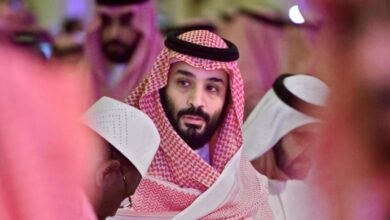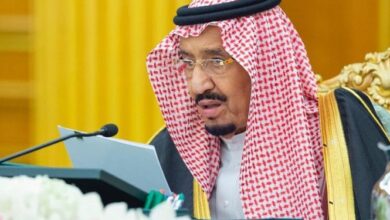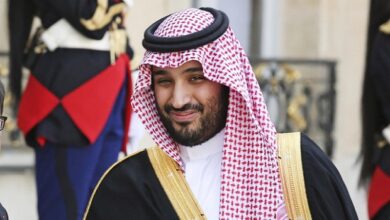Mohammed bin Salman squanders Saudi’s fortunes on his relationships, Kushner an example

New documents revealed Crown Prince Mohammed bin Salman’s insistence on squandering Saudi Arabia’s wealth on his adventures without evidence of the success of his vast investments.
The New York Times revealed that Mohammed bin Salman gave an amount of seven billion and 200 million Saudi riyals (more than $2 billion) to his close friend Jared Kushner, son-in-law of former US President Donald Trump.
According to the documents, bin Salman violated the recommendations of his financial advisors, who didn’t approve the investment because Kushner does not have enough experience to manage such an amount.
According to the New York Times, the response was that after Kushner receives the first $500 million, he will hire financial experts to help him manage the “investment” of Mohammed bin Salman.
Kushner had established close personal relations with bin Salman and gave him advice on dealing with the repercussions of the murder of journalist Jamal Khashoggi. They communicated with each other outside official government channels, using WhatsApp, to the extent that their relationship raised the alarm among US national security personnel.
The documents showed that the Saudi sovereign Fund, managed by Mohammed bin Salman, raised doubts about the feasibility of a two billion dollar deal for Jared Kushner’s company, the new Aventi Partners.
Six months after leaving the White House, where he worked as an advisor to his son-in-law, former President Donald Trump, Kushner was able to secure an investment of two billion dollars, despite the objections of the sovereign Fund’s advisers about the feasibility of investing in the new stock company.
A committee specialized in studying investments has crossed the path of the Saudi Public Investment Fund. The objections centred on what the committee saw as “the inexperience of managing the Affinity Fund” and “the possibility of the Kingdom being responsible for most of the funds in investments and risks.”
Scrutiny of the new companies found that they were “not satisfactory in all respects”, in addition to the amount being “significant”, and there were “public relations risks” stemming from Kushner and his role as a senior adviser in the administration of his son-in-law, Trump.
However, days later, the Fund, led by Mohammed bin Salman, who had Kushner’s support while working in the White House, decided to bypass the committee’s reservations.
According to the American newspaper, trade ethics experts see that the deal appears to be a return of favour to Kushner or a service in advance of Trump’s return to the White House in the 2024 elections.
Kushner played an essential role in defending Mohammed bin Salman, especially after the murder of Washington Post journalist Jamal Khashoggi in 2018.
The newspaper says that the Saudi Fund decided to invest generously with Kushner and more than invest with former Treasury Secretary Steven Mnuchin, who started an investment fund and has a history of successful investing before entering the government, the documents indicate.
The amount that the Saudi Fund committed to his company, “Liberty Strategic Capital”, is one billion dollars. A spokesman for Kushner expressed his pride in his relationship with the Saudi Public Investment Fund and other investors.
The newspaper had revealed last fall about Kushner’s attempts to search for Saudi funds for investment, which the new documents with correspondence reveal in terms of the time of the discussion that took place on them.
It points out that Kushner’s commercial adventure at that point relied on Saudi money. Kushner plans to raise $7 billion, according to a document submitted to the Saudi Fund last summer.
But it seems to have convinced a few investors. In his latest filing with the Securities and Exchange Commission, dated March 31, Kushner indicated that the main money the company was managing, $2.5 billion, came from outside sources, mainly from the Saudi Fund.
According to Saudi documents obtained by The New York Times, Saudi Arabia will receive a 28 per cent stake in the primary investment vehicle for Kushner’s investments in return for the invested amount.
The newspaper adds that there is no law or rules restricting the investment activities of former administration officials who left the White House and benefited from the relationships they built during their work, which is valid for both parties.
However, Robert Weissman, president of the non-profit group Public Citizen, saw Kushner’s relationship with the Saudis as “problematic.” He thinks that his position in the kingdom and its leadership as a prominent advisor “make the business partnership look like a reward and an investment in Kushner at the same time.”
Saudi officials say that the Public Investment Fund, which owns stakes in the “Uber” company and the British “Newcastle United” club, operates independently, with investment committees and a well-thought-out management structure.
When he rose to power in 2015, Mohammed bin Salman took control of the Fund, and he was the final decision-maker in it.
Kushner has little investment experience or a known track record in private equity. Before entering the White House, he ran his family’s real estate business, with sometimes disappointing results.
His best successful deal was to buy the 666 Fifth Avenue office tower in Manhattan in 2007 for $1.8 billion, but the deal became problematic after the economic downturn the following year.
During Trump’s tenure, diplomats and work ethic experiences say that his expected return to running his family’s business represents a conflict of interest and his relationship with Mohammed bin Salman and the wealthy Arabs. They are considered investors in the United States, so the Kushner family approached them.





